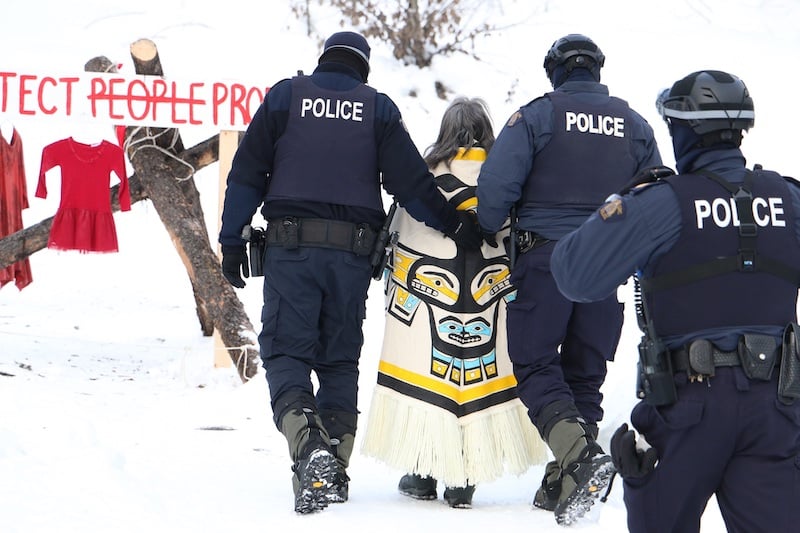“One-way streets.”
That is how Harold Cardinal, the great Cree politician, activist writer and teacher, characterized 100 years of “talking and listening” between Indigenous and non-Indigenous people in Canada.
Yes, there had been a lot of talk. “But,” he wrote, “all talk, brilliant or dull, visionary or cautiously realistic, remains futile when the people you talk to simply won’t listen.”
Cardinal wrote that in 1969, in direct response to then prime minister Pierre Trudeau’s statement “on Indian policy.”
More than 50 years later, as I follow the news stories and interviews about the Wet’suwet’en refusal to allow the Coastal GasLink pipeline through their territory, it is clear that the state of this conversation tragically remains the same now as it was then.
On Saturday morning, for example, I heard federal Transport Minister Marc Garneau assure CBC listeners that his government is “100-per-cent committed to reconciliation” and that the current standoff is “a bump in the road” that will not “cause our government to waver anyway whatsoever with respect to reconciliation.”
“And at the same time,” Garneau continued, he wanted to “make it very, very clear that the rule of law applies in this country, and it is extremely important that that be respected.”
Taken together, these statements amount to an absurd contradiction. Garneau’s use of the phrase “the rule of law” offers an alarming illustration of Canada’s massive and willful ongoing refusal to hear Indigenous peoples.
Politicians of all levels and stripes love to invoke “the rule of law,” as do business leaders and their allies. They utter this phrase as an incantation to conjure a spell of value-neutral logic. They speak it into reporters’ microphones as if a singular “rule of law” is an unproblematic, inviolable and universal concept. It is anything but.
The “rule of law” to which Garneau refers is not a singular, universal given. He is not talking about “the” rule of law, but about the settler-colonial rule of law, the legal and constitutional order that undergirds the Canadian state. A legal order that is a newcomer on the scene.
By many people’s assessment, the hereditary chiefs of the Wet’suwet’en have the rule of law on their side. The Wet’suwet’en rule of law. This is the basis of the authority and jurisdiction that they assert and practise over their yintah, their territorial homeland.
Indigenous laws and constitutional orders — such as that of the Wet’suwet’en — predate the arrival of British or French law in Canada by an order of magnitude so vast that it is difficult to grasp.
The British Crown recognized these legal orders in the 18th century. In the 19th century, the Canadian government used the settler rule of law to outlaw Indigenous forms of governance and to impose a system of elected chiefs and councillors under the Indian Act.
Canada did not succeed at displacing Indigenous law. Outlawed, but not eliminated, hereditary chiefs and Indigenous legal systems survived. Since the 1970s, the Supreme Court of Canada has created a body of law which acknowledges that Indigenous law did not evaporate when the British shouted “Mine!”
In the case of unceded lands, such as those of the Wet’suwet’en (and of much of the rest of British Columbia), the Supreme Court has found that the Crown’s own “rule of law” cannot substantiate its claim to sovereignty, and that Aboriginal title survives.
In 1982, Section 35 of the Constitution Act recognized and affirmed “Aboriginal and treaty rights.” At the time, the visionary Secwepemc leader and activist George Manuel worried that this recognition would amount to little more than the right to “perform Indian dances and songs, and to make bannock.” In the intervening decades, Indigenous peoples have negotiated, litigated and taken direct action to try to give teeth to this constitutional protection. Canada has opposed them at every turn.
This is what the Wet’suwet’en land defenders were doing before the RCMP arrested them. They were enacting the unextinguished Wet’suwet’en rule of law in order to exercise their jurisdiction over their territory. As in Cardinal’s day, a great deal of talk had already taken place. Hereditary chiefs proposed an alternative route through their territory; the company rejected it. And so hereditary leaders asserted their constitutionally protected authority over their yintah, territory that the highest settler court in the land agrees remains subject to Aboriginal title. In so doing, they gave Canada an opportunity to respect Indigenous law and, incidentally, to abide by its own settler rule of law in the process.
I am not an expert in Canadian common law or Wet’suwet’en law. Yet as a layperson, I can understand and respect the fact that Wet’suwet’en law exists.
Efforts by politicians and business leaders to take refuge in a singular, universal “rule of law” can only deflect and distract from the real issue at the centre of the protests and blockades across the country. References to the “rule of law” offer no solution, because the question of whose rule of law is what this conflict is about.
For politicians and pundits to speak as though the nature of “the rule of law” in question is beyond dispute, rather than the hotly contested heart of the matter, is at best ignorant, and at worst duplicitous.
But more important than the intention behind the words of any individual is the broader way in which phrases like “the rule of law” continue to pass as universal in public discourse. This is the legacy of a broader problem: our educational, media and public institutions continue to shroud British or European concepts and structures with a veil of universalism that purports to render them value-neutral and in the process turns them into instruments of settler-colonial, capitalist power.
Our public institutions have failed to teach us to see colonialism even when it stares us in the face. As long as our children learn in school that James Douglas brought “law and order” to British Columbia, we will have adults who settle their uneasy consciences by taking refuge in allegiance to a fictionally singular, neutral “rule of law.”
Support the land defenders or oppose them. Support the Coastal GasLink pipeline or oppose it. But please be clear about what you mean.
When business and political interests invoke the inevitability of “the rule of law,” they are really saying that “the rule of settler law must prevail over Indigenous law.” As members of civil society, we should refuse to allow them this obfuscation. ![]()
Read more: Indigenous, Rights + Justice

















Tyee Commenting Guidelines
Comments that violate guidelines risk being deleted, and violations may result in a temporary or permanent user ban. Maintain the spirit of good conversation to stay in the discussion.
*Please note The Tyee is not a forum for spreading misinformation about COVID-19, denying its existence or minimizing its risk to public health.
Do:
Do not: